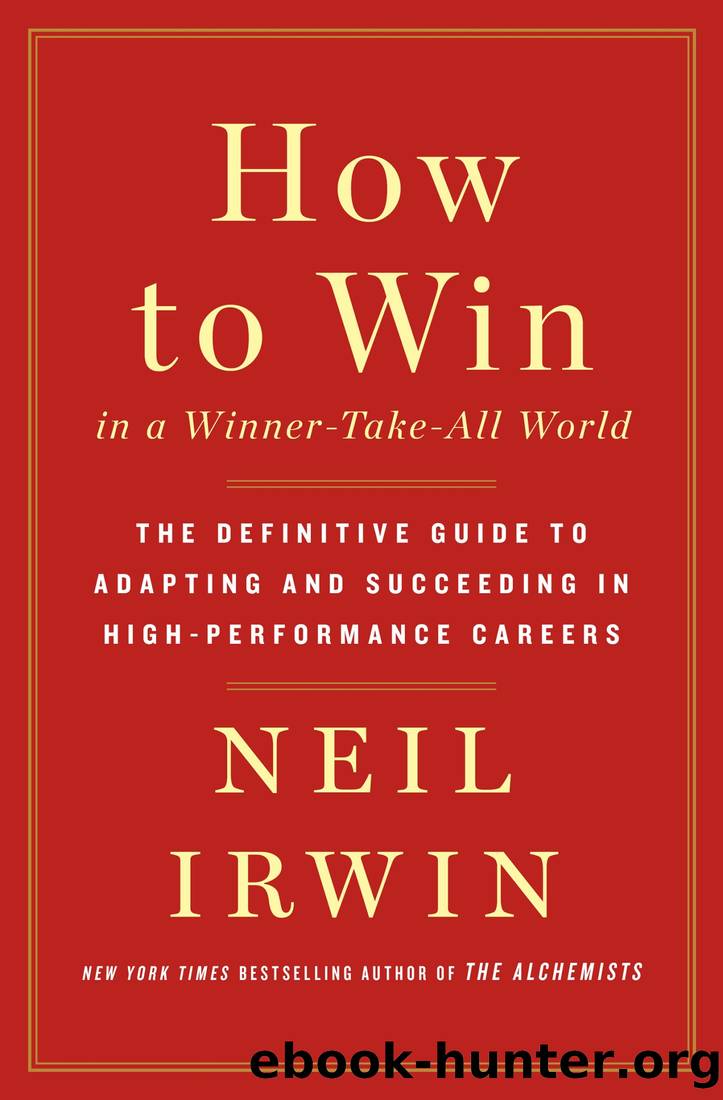How to Win in a Winner-Take-All World_The Definitive Guide to Adapting and Succeeding in High-Performance Careers by Neil Irwin

Author:Neil Irwin [Irwin, Neil]
Language: eng
Format: epub
Tags: Business, Self Help
ISBN: 9781250176288
Google: lI1xDwAAQBAJ
Amazon: B07J4RSKYZ
Goodreads: 42265477
Publisher: St. Martin's Press
Published: 2019-06-18T00:00:00+00:00
6
Navigating the Winner-Take-All World
DO YOU WORK AT A WINNER, AN ASPIRANT, OR AN AFTERTHOUGHT?
Taylor Swift, the singer of infectious pop tunes, is estimated to have made $170 million in 2016. Several dozen more musicians earned in the millions of dollars.1 Yet the median pay of the 40,000 people in the United States who made a living as a musical performer that year was $25.14 an hour, or about $50,000 a year.2 They made a little bit more than tool and die makers and a little bit less than commercial drivers.
The highest-earning womenâs tennis player that year was Angelique Kerber, who made $10.1 million in prize money. The 100th best, a Colombian woman named Mariana Duque-Mariño, had earnings of $309,115, lucrative in the same way being a successful doctor or lawyer might be. The 1,000th best, a Belgian named Sofie Oyen, made a mere $2,678 in winnings; she would probably have earned more teaching retired dentists how to improve their serve at a resort.
In entertainment and sports, itâs always been the case that the very best do radically better than people who are just a tier below themâwinner-take-all, or, if you want to be more precise, winners-take-most.3 One of the most important shifts in the business world over the last few decades is that the same dynamics increasingly apply to which companies prosper. And this has massive, and underrecognized, implications.
Nick Bloomâs advice in the last chapter was to seek out those superstar companies and hang on for dear life. That can be good advice, as far as it goesâif your personality, your skills, your ambitions, and your luck in the job market all align. Frequently, however, that is not the case. Working at a large, profitable company has a lot of advantages. But for the right person at the right career stage, so does joining a more entrepreneurial upstart, or an established company that is experiencing hard times and is at risk of being one of the losers in the winner-take-all world.
The way to navigate the winner-take-all nature of modern business, in other words, is to understand the reasons for it, where your employer fits into that competitive landscape, and how to make the most of whatever advantages that position offers. This chapter is a guide to doing that.
Download
This site does not store any files on its server. We only index and link to content provided by other sites. Please contact the content providers to delete copyright contents if any and email us, we'll remove relevant links or contents immediately.
| Business School Guides | GMAT |
| Guides | Interviewing |
| Job Hunting | Job Markets & Advice |
| Resumes | Vocational Guidance |
| Volunteer Work |
The Motivation Myth by Jeff Haden(5205)
Audition by Ryu Murakami(4923)
Adulting by Kelly Williams Brown(4566)
The Confidence Code by Katty Kay(4251)
A Mind For Numbers: How to Excel at Math and Science (Even If You Flunked Algebra) by Barbara Oakley(3302)
Waiting in the Wings by Melissa Brayden(3215)
Self-Esteem by Matthew McKay & Patrick Fanning(3141)
Fooled by Randomness: The Hidden Role of Chance in Life and in the Markets by Nassim Nicholas Taleb(3108)
The ONE Thing by Gary Keller(3066)
Nice Girls Don't Get the Corner Office by Lois P. Frankel(3043)
The Dictionary of Body Language by Joe Navarro(2992)
How to be More Interesting by Edward De Bono(2789)
Designing Your Life by Bill Burnett(2741)
Getting Things Done by David Allen(2691)
The Plant Paradox by Dr. Steven R. Gundry M.D(2611)
Police Exams Prep 2018-2019 by Kaplan Test Prep(2540)
What Color Is Your Parachute? 2015 by Richard N. Bolles(2306)
Dangerous Personalities by Joe Navarro(2283)
When to Jump by Mike Lewis(2239)
